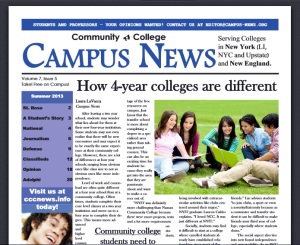 Originally published June 2013.
Originally published June 2013.
By Laura LaVacca
Campus News
After leaving a two year school, students may wonder what lies ahead for them at their new four-year institution. Some students may not even realize that there will be new encounters and may expect it to be exactly the same experience at their community college. However, there are a lot of differences at four year schools ranging from obvious ones like class size to not so obvious ones like more independence.
Level of work and course-load are often quite different at a four year school than at a community college. Often times, students complete their core level classes at a two year institution and move on to a four year to complete their degree. This means more advanced and higher level courses in their area of majoring. This can be an adjustment, however students should seek out tutorial departments and take advantage of the free resources on campus. Just know that the transfer school is more about completing a degree in a specialized area rather than taking general courses. This can also be an exciting time for students because they really get into the area that they are passionate about and want to make a career out of.
“NYIT was definitely more challenging than Nassau Community College because there were more projects, tests and a lot more requirements on students. There was a large emphasis on students getting internships, being involved with extracurricular activities like clubs centered around their major,” NYIT graduate Lauren Calder explains. “I loved NCC. It was just different at NYIT.”
Socially, students may find it difficult to start at a college where enrolled students already have established relationships since most of the student population has been attending since freshman year. Adelphi transfer student, Stacey Lin notes that the hardest thing about starting the four year university was “making friends.” Lin advises students “to join clubs, a sport or even a sorority/fraternity because as a commuter and transfer student it can be difficult to make friends your third year of college, especially where students dorm.”
The social aspect also ties into new found independence and responsibility. As an NCC transfer student to Cortland University, Victoria Noelle notes, “I think the first thing is that you do learn a lot about yourself when switching to a four year university because you don’t have your parents there telling you what you can and cannot do, therefore you make decisions on your own.” Students should recognize this new found independence that can seem somewhat daunting yet liberating at the same time.
Noelle continues, “There’s a lot to consider when transferring like jobs, internship opportunities and location to careers when you graduate. In addition, I definitely concentrated more at home because going away can quickly become a free for all with parties and night life.”
Danny Green, associate vice president for enrollment at Meredith College in Raleigh, N.C, states: “What a community college graduate will encounter at the four-year college is a very welcoming environment so that the transfer student can thrive and succeed. Is this always the case? At the best, transfer-friendly schools like ours, transfer students are invited into the community, assigned advisors and mentors, and provided an array of connections that help make the transition as easy as possible. Students can expect to succeed if they are focused and ready to be full participants on the campus (e.g., academically prepared in class, socially engaged in campus events and activities, ready to take advantage of resources and campus services, etc.). Successful community college transfers will be specific on the majors they wish to pursue. Campuses like ours want the new students, like all students and faculty, to be full community members. The individual experience, while working as a part of the whole, will help students to thrive.”
Students should be prepared to make decisions solo and keep themselves in check when it comes to nightlife.
Lastly, obvious things like larger classes and lecture halls come with the four year college territories. Students, who are transferring, should tour their new schools, talk to advisors and clear up any concerns they may have. Contacting the school for orientation days and personal tours are also options to get acclimated with the new surroundings. Attending orientation is also a great way to meet some friends who are in the same boat. Colleges like Nassau Community also host on site visit days where four year schools in the area come to campus to “receive a preliminary evaluation of transfer credit” and “financial aid advisers discuss scholarship opportunities.” On-site visits are good ways to discuss students’ plans with prospective colleges.
Transferring to a four year institution is an exciting time so don’t let it be plagued with worry. Be prepared about the new school and expect to work hard and meet all the demands.






Facebook Comments